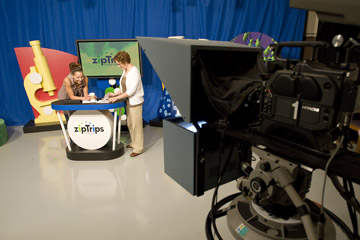Did You Know?: Purdue zipTrips

Jessica Jackson, host of zipTrips, and Jamie Loizzo, zipTrips project manager, rehearse on the set of the live electronic field trip. (Purdue photo/Andrew Hancock)
On a colorful set in the basement of Stewart Center, Purdue staff, researchers and faculty members combine science with production, education with electronics and teaching with technology to create zipTrips -- live electronic field trips for sixth-, seventh- and eighth-graders across the world.
Since 2007, Purdue staff in ITaP Video and Multimedia Production Services, Agricultural Communication, the School of Veterinary Medicine and the Discovery Learning Research Center, plus 35 scientists from across campus, have scripted, practiced, recorded and performed the 45-minute, free-of-charge field trips, which don't require school buses, permission slips or sack lunches but still offer opportunities for learning, fun and interaction.
All scripts and lesson plans for the annual shows -- "We're All Animals," "Disease Detectives" and "It's a Gene Thing" -- reflect national and state science standards. The project, funded by a five-year grant from the Howard Hughes Medical Institute to J. Paul Robinson in Purdue’s School of Veterinary Medicine, began as a program geared toward Indiana rural schools. Now it has a worldwide viewership including audiences in Honolulu, Hawaii; Calgary, Canada; Puerto Rico; Shetland, United Kingdom; and Okinawa, Japan.
On average, 40 to 60 schools watch the live shows when they air in September, November and February. An additional 70 to 80 schools watch archived shows, use lesson plans or view shorter online videos.
"This is one of my favorite projects to work on," says Jamie Loizzo, zipTrips project manager. "I've worked on news shows where we would do live hurricane coverage, and that was not as exciting as the unpredictability of having animals, children, scientists, technology and all the other components come together to create zipTrips."
Animals such as pigs, horses, grasshoppers, salamanders, lizards, bearded dragons and dogs have appeared on zipTrips. Technologies on the show range from a 72-inch plasma television and an iPad on the set to a full production studio with cameras, soundboards, teleprompters and lighting. Satellite feeds, Web streaming and video conferencing equipment are used also.
Each of the three live shows connects students with research being done at Purdue, and host Jessica Jackson helps bridge the gap between the scientists presenting the material and the young students. Laurent Couetil, professor of veterinary clinical sciences, appears regularly on the "We're All Animals" episode with Whitey the horse running on a large treadmill.
Loizzo says, "We try to think of really cool and unique scientific visuals that will get the kids excited and will stick with them. We're trying to show students that there are many different and fun ways to be a scientist."
Along with the educational aspect of the program, zipTrips serves as a research project. Willie Burgess, managing director for DLRC, works with DLRC staff to analyze how participating in the electronic field trips impacts student perceptions of science and scientists. All participating schools are invited to take part in the zipTrips assessment, which includes a "Draw a Scientist" activity. Analysis of student pre- and post- drawings indicates that zipTrips participation results in more positive student perceptions of science and scientists. On average, 500 to 700 students return evaluations per show.
Burgess and Loizzo are focused also on how to make zipTrips as interactive as possible. Currently students can email questions to scientists during live shows, but typically only 20 of the 119 are addressed during the live show.
"We want students to feel like all of their questions are important and being considered," Loizzo says. "We are working to incorporate HotSeat, a mobile web application developed by ITaP, to allow students to provide real-time feedback to us and each other during the shows and to help us improve their experience."
A middle school in Lafayette will be testing the HotSeat application during the upcoming live show on Nov. 17. Currently, 138 schools with 6,184 students are registered to participate in the "Disease Detectives" zipTrip. A map showing the distribution of participating schools in the U.S. is available here: https://g.co/maps/dkkh7.
Although support from HHMI ends September 2012, the zipTrips team hopes to continue the program and is seeking future funding. One option is to partner with Purdue programs wishing to fulfill a grant's educational outreach component.
For more information on zipTrips, visit www.agriculture.purdue.edu/ziptrips.
